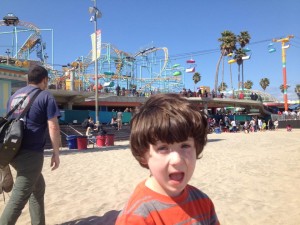Last Saturday, Dar had one of those days. And got me thinking about his perception and how it relates to rollercoasters.
It started well enough. Dar had woken up without his maniacal giggles, but also without a lot of undue whining. In other words, he was relatively calm. I told wifey that I would walk Dar and our dog to Peet’s to procure our morning coffees. It’s a walk Dar has done dozens of times. This time, something about it seemed to change him: by the time we arrived at Peet’s, he was terribly whiney. On the way back to our house, Dar was going “unh-unh-unh” as though being poked in the ear.
I have thought of recording his whines and placing the audio files on this blog. But then – that seems too much, for me and for you. In any event, you’ll just have to trust me that the cumulative effect is like listening to a dentist drill your child’s teeth for hours. Another bit of trust I require is in the veracity of this statement: these moods of Dar don’t really have antecedents. We keep meeting new therapists who hear about this or that temper tantrum, look at us very sincerely, and say “and what happened before?” And I get it, they’re just doing their job. After knowing Dar for six months – after enough moments of his screaming that they rightfully don’t want to be blamed for – they will now tell the new therapist: “Yeah, he’ll just do that.”
Still, it’s hard to shake loose the hope that changing the background and activities will somehow change Dar’s mood. Heck, that’s a big reason we take any kind of vacation, even to somewhere as close as Monterey. Which is where we were headed on Saturday. I believe I’ve written here that Dar is often good in cars, and that’s true. Not Saturday, at least not for very often. He wasn’t screaming constantly, he just whinged like John McEnroe talking to a line judge. Uh, but with less logic. Which I guess isn’t entirely alien to other parents’ experiences.
The thing is, when your neuro-typical kid whines and whines, if they’re three years old or older (I now know this), you get to talk to them. You get to present a choice to them, like for example, stop or we turn around. You get the satisfaction of demonstrating your mastery of logic, and perhaps more mastery than that. Perhaps I should be grateful to Dar for demonstrating to me my non-mastery of anything. But get in a car with a whining child for two hours and then show me your gratitude, there, Dalai Lama. And tell me how all this is affecting the aforementioned neuro-typical child.
We stopped at Año Nuevo. In theory, this might have been a cheer-upper for Dar, who has always loved the feel of the wind on his face, the shimmer of the dappling light through the trees. Yeah, not so much on Saturday. This isn’t peak season (when the seals fight and mate and give birth), and it was overcast, so we pretty much had the place to ourselves. It’s about a 30-minute walk to the beach populated by hundreds of elephant seals, but it felt more like 3 hours, based on Dar’s constant complaining. Upon arrival, we found that Dar did not care one whit about the seals. Great. Walk back. Same bottomless well of protests.
So, if not a long nature hike, what about something more urban? As it happened, we’d planned to, and did, try the Santa Cruz Beach Boardwalk. This was both kids’ first time at anything like a carnival or amusement park. Now, some of my autism peeps want to stop the story right this second and warn me about crowds and sensory overload. Right, but remember we had just unsuccessfully tried the opposite. But…yeah, he wasn’t into rides. His agitation increased as we waited in line, and so, on the first kiddie ride, I took him out of the line and onto the beach. Sand itself has been a helpful panacea, and so it was then…at least a little. Good reason to have tried Santa Cruz Beach Boardwalk before Six Flags in Vallejo. (Meanwhile, our just-turned-3-year-old loved all the rides he tried, and insisted on going again and again, even alone.)
Sitting on the beach with Dar and watching people scream with joy and terror from the cars of the 91-year-old Giant Dipper, I wondered, not for the first time, if Dar’s condition is a lot like being on a rollercoaster. I don’t believe Dar perceives the world the way we do; I believe he sees it as more of a blur, or perhaps like a film that skips every other frame, or some other kind of fragmented perception. Adults, like his kindergarten teacher last week, will effuse to me “Dar has just had the giggles all day!” I smile politely, but inside I’m thinking, yes, that’s simply the flip side of the days like Saturday, when he acts like he’s got flies under his eyelids. He’s on a rollercoaster, and sometimes it feels great, and other times it feels lousy. Are there rollercoaster studies? Would these studies help chart when exactly people feel good, and feel bad, during the ride? A certain kind of curve or bend in the track? That’s what we need. Well, we also need some way to stop the ride, or perhaps turn it into one of our younger one’s kiddie rides.
But, you know, SIGH. Until we hear different, Dar is on his rollercoaster, and we’re all on the rollercoaster of love for Dar, and there’s no getting off, and no changing the way it rocks and rolls.

